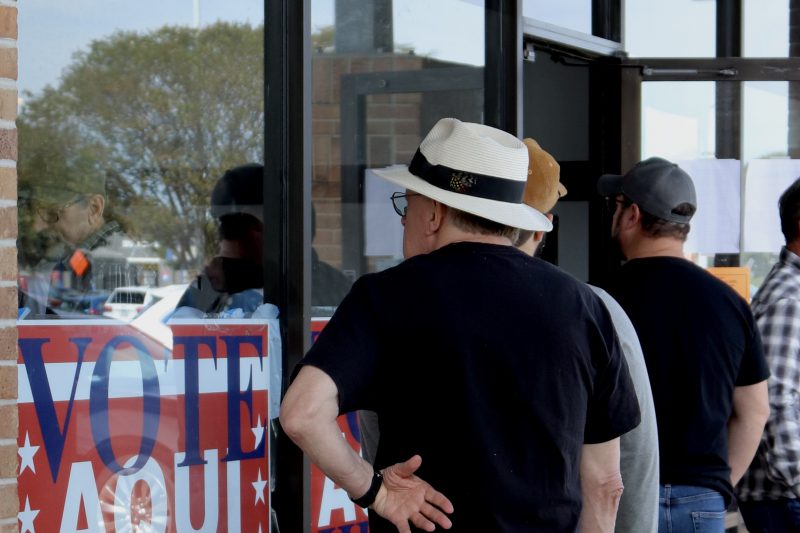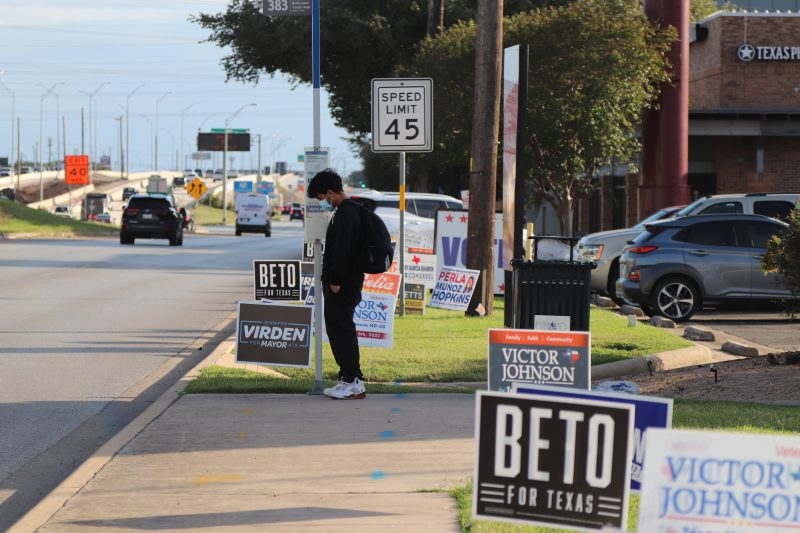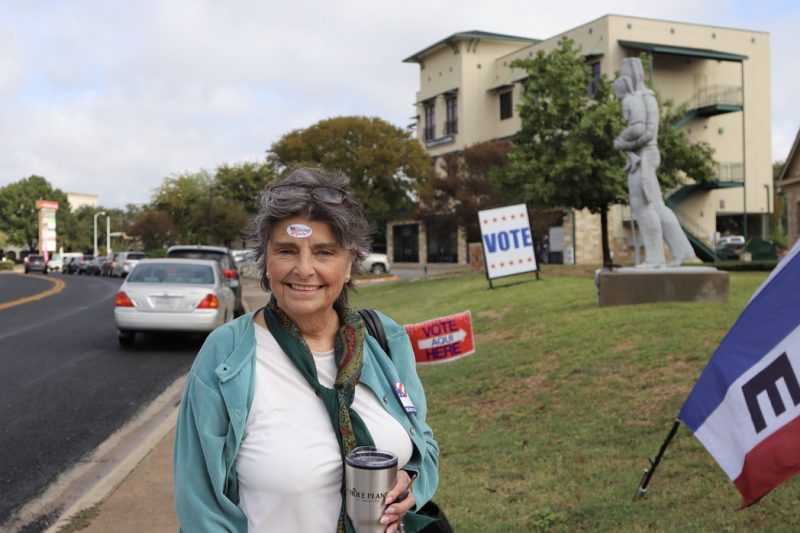Poll Watchers Gearing Up for Midterms With New Texas Election Law in Effect
By Samantha Eisenmenger
Reporting Texas

Early voters wait in line to cast their ballot for the midterm election at the Balcones Woods Shopping Center polling place in Austin on Oct. 31, 2022. Samantha Eisenmenger/Reporting Texas
Thousands of poll watchers are expected Tuesday in the first test of Texas’ new voting law. While some are hoping for more election transparency and accountability, others are concerned about potential disruptions and confusion at polling locations as election onlookers enjoy greater access at polling sites.
“I’m anxious,” Allison Smith, who will be serving as a Hays County poll worker for the second time, said of the potential for interference at the polls. “I’m concerned that they will challenge. And I hope that they will be reasonable and when reviewing any challenges, that the review will be reasonable.”
Growing political distrust fueled by former President Donald Trump’s unsupported claims of election fraud in 2020 has increased interest in Texans becoming poll watchers this year. The Texas secretary of state office says 4,480 Texans completed a new poll watcher certification training program that launched Feb. 1.

The number of poll watching volunteers increased during the 2022 midterm elections in Austin, Texas, where a commuter waits for a bus amid campaign signs at the Balcones Woods Shopping Center polling location on Oct. 27, 2022. Samantha Eisenmenger/Reporting Texas
Poll watchers are unpaid, politically appointed volunteers who must be certified by the secretary of state after undergoing a training program. They also must be backed by a political party, candidate or political action committee.
Texas’ new election law, passed by the Legislature in 2021 and signed by Gov. Greg Abbott, relaxed rules on poll watchers’ access by giving them “free movement” within polling stations. Still, they may not interfere with voters casting their ballots, but poll watchers can only be removed when election judges see them violating the rules.
The poll watcher training became more rigorous under a Texas House amendment added to the 2021 law.
“Someone who wanted to be a poll watcher could literally scroll through the whole poll watcher training in less than five minutes and be able to get their certificate of completion of the training,” said Louis Bedford, an election and voting rights lawyer in Dallas. “Now, people who want to be poll watchers are asked questions, so they need to have a better understanding of what poll watchers are allowed to do and what they’re not allowed to do by Texas state law.”
Doug Kelsay, a Republican Party precinct chair in Bastrop County, said he’s been an election judge in the past but decided to be certified and serve as a poll watcher for this year’s election.
“As an election judge you’re real busy,” he said, but as a poll watcher he can “stand back and watch the patterns.”
“The integrity of elections is now much more suspect than it ever has been in my lifetime,” Kelsay said. “I know that all sorts of things can happen. So my inspiration is in wanting to ensure that we have as good of elections as we possibly can.”
As an added security measure, Bastrop County elections administrators are recommending that election judges take poll watcher training so that “they are aware that poll watchers do play an important role in security of elections and that they need to be welcomed,” said Kristin Miles, election administrator Bastrop County.
“But I also think it’s important that the election workers who are working a polling location are aware of what poll watchers can and cannot do,” she said.

Ellen Murry stands in front of the Ben Hur Shrine Center polling location after finishing her morning shift as a poll watcher for the midterm elections in Austin, Texas, on Oct. 27, 2022. Samantha Eisenmenger/Reporting Texas
Ellen Murry, who is serving as a Travis County Democratic Party poll watcher for the first time, says she experienced no problems during the early voting period, which ended Friday.
“I can’t tell you who’s a Republican or Democrat with that group,” she said of the polling site workers she’s observed. “They’re just decent, sincere people, and that’s what you hope for. This is America.”
Meanwhile, a group of Texas lawyers and volunteers called the Texas Election Protection team plans to monitor balloting from outside polling places and offer assistance to voters who may experience problems casting their ballots. The group, which is sponsored by the League of Women Voters, Anti-Defamation League, American Bar Association and dozens of other nonprofits, is concerned that poll watchers might harass some voters.
“We have hundreds of volunteer nonpartisan poll monitors who will be stationed across the state and hundreds of legal volunteers ready to answer voters’ questions until the polls close on Election Day,” said Sofia Fernandez Gold of the Lawyer’s Committee for Civil Rights Under Law.
Under the Texas law, poll watchers are barred from speaking directly with voters or official election workers at polling sites. They are instructed to report potential problems to the site’s head election judge or to their party leaders.
“We did go for instruction and they talked about poll watchers there and what the requirements for poll watchers are and that we as poll workers have the ability to stop them from doing anything that they shouldn’t be doing,” said Smith, the Hays County poll worker. “Or we can ask them to leave if they don’t have the right credentials. And so, I’m feeling OK about that.”
Smith said she looks forward to working on Election Day. “I’m a bit excited. I don’t mind having a little bit of trouble. I’m a people person, because I’m a nurse and I’ve been known to talk people down quite a bit,” Smith said, with a laugh. “Quite a few times!”
Still, many described themselves as anxious.
“I don’t know where the country is going at this time,” said Murry, the Travis County Democratic poll watcher. “Because the attitude is ‘unless my team wins, the election was stolen.’ If the Democrats do pull this off, these people will be at the barricades denying that they won. ‘It was stolen!’ But if the Republicans win, ‘it was the safest election since sliced bread.’ You know what I mean?”